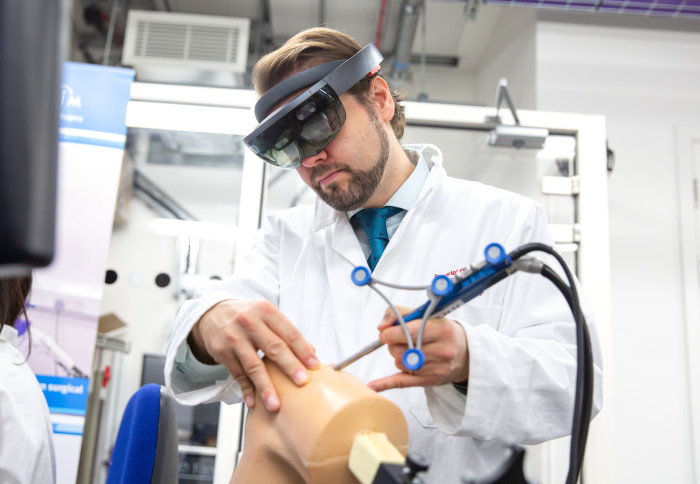Imperial and TUM launch joint PhD programme in AI, robotics and healthcare

Professor Ferdinando Rodriguez y Baena will co-lead one of the projects
Imperial and the Technical University of Munich (TUM) have launched a joint PhD programme that will initially focus on AI, robotics and healthcare.
The Joint Academy of Doctoral Studies aims to strengthen collaboration between researchers and PhD students at the two institutions.
The first wave will support six collaborative research projects, with each individual project led by both an Imperial and a TUM supervisor and underpinned by two doctoral candidates from each university.
The PhD students will spend extended periods at each institution to help build their networks and expand their knowledge.
Training the next generation of innovators
Imperial's Vice President (International) Professor Maggie Dallman said: "Our partnership with TUM is really built on a firm foundation of decades of strong research links between individual researchers, which has resulted in more than 600 joint publications with TUM in the last five years. Imperial and TUM have also collaborated on 32 EU funded projects – including 13 within Horizon 2020.
"We are both STEMB focused universities sharing a strategic mission of doing science that benefits society. I think we are two of the world's most entrepreneurial universities in two of the world's most dynamic cities and there is much more we can do together. The Joint Academy of Doctoral Studies will train the next generation of researchers and innovators."

TUM's Senior Vice President International Alliances and Alumni, Professor Juliane Winkelmann, said: "Imperial is the ideal partner for our ambitions and the last two years has already shown the great potential that lies in our collaboration.
"Our young researchers will shape the future of science and research so we believe we should equip them with the best skills and knowledge available."
Deputy Mayor of London for Business, Rajesh Agrawal, said: "Universities like Imperial drive innovation and scientific advancement and supply London's businesses with the talent they need."
The Bavarian State Minister of Science and the Arts, Bernd Sibler, also spoke at the event, highlighting Bavaria's AI strategy.
The event to launch the new programme was chaired by Alexander von Humbolt Professor for Artificial Intelligence at TUM and Imperial Professor, Daniel Rückert. The academic leads for the programme are Imperial’s Professor Aldo Faisal and TUM’s Professor Nassir Navab.

In 2018, Imperial and TUM formed a flagship partnership in education, research and innovation.
Imaging, robotics and exoskeletons

The first six projects are:
Representation Learning in Oncologic Imaging - Dr Ben Glocker (Imperial) and Professor Marcus Makowski (TUM)
Motion-Corrected Quantitative Body MRI - Dr Bernhard Kainz (Imperial) and Professor Dimitrios Karampinos (TUM)
Confidence-driven Robotic Ultrasound Tissue Scanning for Surgical Resection Guidance - Dr Stamatia Giannarou (Imperial) and Professor Alin Albu-Schäffer (TUM)
Human not Monkey Robotics: Neuro-inspired object manipulation with dextrous hands - Professor Aldo Faisal (Imperial) and Professor David Franklin (TUM)
Sensory Motor Interface for Lower-extremity Exoskeletons - Dr Ravi Vaidyanathan (Imperial) and Professor Klaus Drechsler (TUM)
Non-fluoroscopy-based Robotic Catheter Manipulation and Tracking based on Machine Learning, Bioelectrical Localization and Robotics - Professor Ferdinando Rodriguez y Baena (Imperial) and Professor Nassir Navab (TUM)
--
 The projects are supported by the UKRI Centre for Doctoral Training in AI for Healthcare.
The projects are supported by the UKRI Centre for Doctoral Training in AI for Healthcare.
Article text (excluding photos or graphics) © Imperial College London.
Photos and graphics subject to third party copyright used with permission or © Imperial College London.
Reporter
Stephen Johns
Communications Division